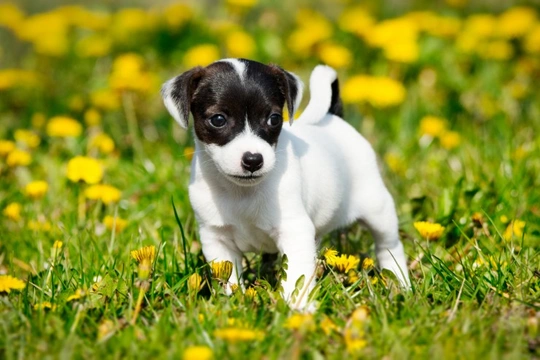
Jack Russell Frequently Asked Questions
What health issues affect Jack Russells?
In general, Jack Russells are a healthy breed especially when they are responsibly bred which means parent dogs are health tested for known hereditary and congenital disorders. The health issues that affect the breed are as follows:
- Legg-Calve-Perthes disease
- Late onset ataxia
- Canine spinocerebellar ataxia
- Primary lens luxation
- Patellar luxation
What is the life expectancy of a Jack Russell terrier?
Being a small breed, Jack Russells boast a longer lifespan than larger dogs. When well cared for and fed an appropriate diet when they are puppies, as adults and in their golden years, a Jack Russell can live anything from 13 to 16+ years. Keeping a dog well exercised so they don’t carry too much weight also goes a long way in making sure they live longer – an obese Jack Russell will have a shorter lifespan than a dog that’s fit and healthy.
Why do Jack Russells shake so much?
A lot of Jack Russells shake when they are excited about something or when they have tracked down their prey. However, a dog may also shake because they are frightened of something and this includes fireworks when they are let off close by. Dogs also find thunderstorms quite scary and will shake when it thunders. Because Jack Russells are always on the alert, which is a trait that is deeply embedded in their psyche, whenever something happens around them, they often respond by shaking.
Are Jack Russells aggressive?
Most Jack Russells are social more especially if they have been introduced to lots of other dogs and situations at a young enough age. As with many other breeds, same-sex dogs may show aggression towards each other, something that is very evident in many “terrier” breeds.
How easy is it to train a Jack Russell?
Jack Russells are clever, quick-witted little dogs, they also love to please which means that in the right hands, they are easy to train. The key is to start their education early and to be consistent the whole time. Ideally a puppy’s training should start when they are 8 weeks old which is when they can be taken away from their littermates and mothers. Their first training sessions should be more “play” than training to avoid putting too much pressure on a puppy’s developing joints.
Are Jack Russell's smart?
Jack Russells are very clever little dogs and they learn things extremely quickly but this includes both the “good” and the “bad” which is why owners have to be firm yet fair with them. Jack Russells need to know who they can look to for direction and guidance, they must know who is the “alpha” dog or they will quickly take on this role themselves, making them harder to handle and live with.
Do Jack Russell terriers shed a lot?
Jack Russells shed and they shed a lot throughout the year and even more so in the spring and autumn. The best way to keep on top of dead and shed hair, is to groom a Jack Russell more frequently to keep hair of the furniture and from being left around the house.
Can Jack Russell Terriers jump?
Although short in stature, a Jack Russell has an amazing spring in their legs. Some of these terriers have been known to jump as high 5 foot which is why garden fences not only have to be secure to keep a Jack Russell safely in but the fencing has to be high to prevent them from jumping out.
How much does a Jack Russell puppy cost?
Jack Russells are among one of the most popular breeds in the UK and well-bred, Kennel Club registered puppies can command a lot of money which can be upwards of £400. Non Kennel Club registered puppies can cost a little less with most responsibly bred Jack Russells costing around £350. It is worth noting that puppies should not leave their mothers or littermates when they are too young and most responsible breeders would never let a puppy go before they are 8 weeks old.
Do Jack Russell Terriers feel the cold?
Some Jack Russells feel the cold more than others. If you own a dog that shivers when the temperature drops although it is not that cold, but rather just “cooler”, it’s best to put a coat on them to keep them warm. During the winter months, many Jack Russell owners choose to put warm coats on their dogs when they are out on a walk to make sure their pets don’t catch a chill.
Are Jack Russell Terriers aggressive?
Jack Russell Terriers have a high prey drive, but they are not generally aggressive towards people especially if they have been responsibly bred and well socialised from a young enough age. The only time a Jack Russell may show any sort of aggression is towards a same-sex dog which means that when two dogs or two females are together, they should always be well supervised to avoid any nasty bites or fights that could end up with having to pay an expensive vet bill.
Looking for more Jack Russell Information?
Read our Pets4Homes Jack Russell Dog Breed Profile for further information on the Jack Russell.



